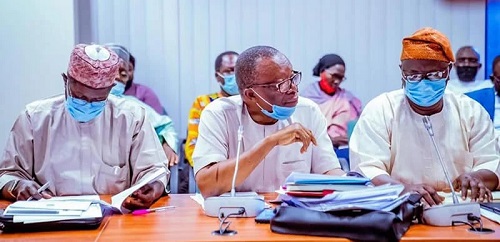In this piece, Vanguard Law and Human Rights, traces the cause of action that prompted the Federal Government to drag the Academic Staff Union of Universities, ASUU, before the National Industrial Court , NIC, examines the provisions of the Trade Dispute Act regarding the mandatory procedure to invoke the jurisdiction of the National Industrial Court on resolution of trade dispute; examines the level of compliance by the Federal Government with the mandatory procedure before referring its dispute with ASUU to NIC; surveys stakeholders on the appropriateness of FG resorting to court action and argues that dialogue still remains the best option to break the instant logjam.
Background
On September 26, 2022, the Vice-Chancellor of the University of Ibadan, Prof. Kayode Adebowale raised the alarm over what he claimed appears to be the bleak future of university education in the country.
The university administrator was at the valedictory lecture organised in honour of a renowned Professor of Organometallic and Coordination Chemistry, Timothy Odiaka, in Ibadan, the Oyo State capital, when he expressed the fears.
Odiaka retired from active service for clocking the mandatory retirement age of 70 years.
Prof. Adebowale had contended that despite mass retirement of experienced lecturers who clocked mandatory retirement age of 70 years at the university and the exodus of young lecturers from Nigerian universities to seek greener pastures abroad, universities could not employ new hands to replace them because of embargo on employment in the civil service which was extended to the universities.
The Dean of the Faculty of Science of the university, Prof. Adekunle Bakare, who corroborated Prof. Adebowale’s fear said the impact of the exodus of the best brains from the universities today would be worse felt in the near future if nothing urgent was done to reverse the trend.
The retiring Professor of Organometallic and Coordination Chemistry, Timothy Odiaka, who was on all fours with his colleagues said: “We are in trouble in Nigeria, and the Federal Government is not helping us. The younger ones who are brilliant have relocated abroad. As soon as they complete the first degree, they relocate abroad, they do well there, and they are not coming back to this country.”
The top-flight academics took turns to discuss the issue on a day a top policymaker at the Federal Ministry of Education, who preferred anonymity hinted that the Federal Government was also concerned about the on-going brain drain at the ivory towers occasioned by various factors including the on-going industrial action embarked upon by the Academic Staff Union of Universities, ASUU since February 14, 2022 and has decided to break the back of ASUU at all costs.
Vanguard reports that the Federal Government had dragged ASUU before the National Industrial Court in Abuja and had succeeded in getting an order directing the striking lecturers back to work in the interest of the country and the students who were sent home from their various campuses since February 2022.
Although ASUU was aggrieved by the verdict and had since filed an appeal to upturn the decision, the Federal Government is insisting that the court order must be complied with in the first instance, before further negotiation on the issues between them would proceed.
Already, the central government had through the National Universities Commission, NUC issued a directive to the vice-chancellors to open the gates of all public universities in the country and upon resumption, open attendance register with a view to tracking lecturers who are willing to resume work and identify those who are unwilling to work.
Although the directive was withdrawn in less than 24 hours, the top policymaker at the Federal Ministry of Education who spoke with Vanguard disclosed that the central government had envisaged that some lecturers might not resume work but that it was planning to source competent lecturers from private universities across the country to replace those that would default in attendance.
The source also said civil servants who just retired upon the attainment of the mandatory 60 years in service but who have the requisite qualifications and experience could be considered for employment in the university as lecturers. The plan has left tongues wagging.
Issues between ASUU and FG
Sometime in October 2009, the Federal Government, FG entered into an agreement with the Academic Staff Union of Universities, ASUU on conditions of service for university lecturers; funding of public universities, university autonomy and academic freedom, among others.
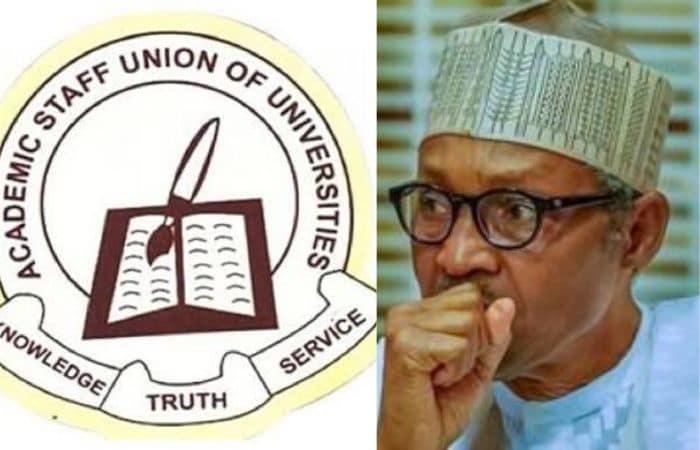
But the FG, according to ASUU, has consistently been reluctant to implement the agreements reached with it.
Both parties had met severally on the modalities for the implementation to no avail.
That was the situation when ASUU, on February 14, 2022, embarked on a four-week warning strike to compel the Federal Government to take steps on the agreements reached with the union.
Specifically, the union wanted the government to act on some of the contending issues including the renegotiation of the 2009 ASUU/FGN Agreement, improved welfare, funding for the revitalisation of public universities, which amounts to N1.3 trillion, payment of earned academic allowances, and adoption of the University Transparency Accountability Solution, UTAS as a preferred payment option instead of the Integrated Payroll and Personnel Information System, IPPIS, and payment of promotion arrears.
Vanguard reports that the reason(s) advanced by ASUU to hold the FG by the jugular in order to restore quality to university education in Nigeria, particularly at the level of federal and state-owned universities, may not be totally out of place given the poor ranking of Nigerian universities not only in the Commonwealth but also in the world.
For instance, Nigeria, the giant of Africa, is conspicuously missing from the World Education Forum’s list of the top 10 African countries with best education system in its 2022 report. Seychelles was number one on the list followed by South Africa; Ghana 7th; Namibia 9th and the war-torn Libya in 10th position!
Nigeria was also not on the list of the top 10 African countries with the highest literacy rate. Equatorial Guinea topped that list with 95.3%; South Africa, second with 94.3% literacy rate; Libya, 5th at 91.00%; Zimbabwe has 86.5% literacy rate, placing it 8th in Africa. Nigeria’s literacy rate is put at 62% but with 10.5 million out-of-school children, aged 5-14 years, the highest in Africa and second highest in the world after India!
Although, Nigeria is listed as having the highest number of universities in Africa—262, followed by Tunisia, 204; Morocco, 153 while others in the top 10 are Kenya with 129; South Africa, 123; Algeria, 104; Ethiopia 73; Egypt 70; Ghana 70 and Uganda 69, yet, in the Times Higher Education’s World University Ranking 2022, it was only the University of Ibadan that was ranked among the top 10 universities in the continent and in the 10th position!
In the ranking which ASUU said it is not comfortable with owing to failure by the FG to heavily invest in university education as agreed in the 2009 FGN/ ASUU Agreement, South Africa, which has less than half the number of Nigerian universities—123—had the top three best universities in the continent (University of Cape Town, Stellenbosch University and University of Witwatersrand).
Indeed, among the top 10, South Africa had five; the additional two being the 5th-placed University of Kwazulu-Natal and Durban University of Technology at 9th. Ghana’s University of Cape Coast was ranked 4th.
These statistics show that for Nigeria, university education is rated high in terms of quantity of university institutions established in the country but rated very low in terms of quality.
FG sets up Prof. Brigg-led committee to address issues raised by ASUU
It is on record that in less than one month after ASUU began its warning strike in protest against the attitude of the FG to the 2009 Agreement it entered with the union, the government inaugurated a seven-man committee charged with the responsibility of renegotiating the 2009 agreement reached with ASUU and other university-based staff unions.
The committee, which has the Pro-Chancellor of Alex Ekwueme Federal University in Ndufu-Alike, Emeritus Professor Nimi Briggs, as chairman, was given three months to submit proposed draft agreements to the Federal Government.
A similar committee headed by the Pro-Chancellor of the University of Lagos, Akoka, Chief Wale Babalakin (SAN) set up by the Federal Government could not complete its work for obvious reasons.
After intensive bargaining, ASUU came to a compromise with the Professor Briggs-led Team leading to the submission of the second Draft Agreement to the Federal Government in June, 2022 for consideration and approval for signing by the two parties within one week.
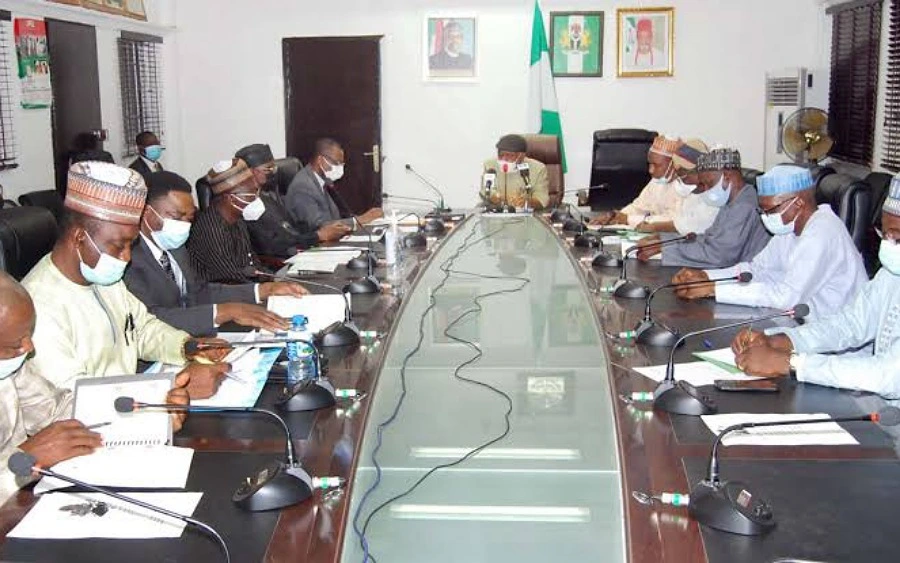
According to Prof. Osodeke: ‘’This was done in line with the principle of collective bargaining.
“But shortly after and against all expectations, however, the Minister of Labour and Employment, Dr. Chris Ngige, and later his Minister of State, Festus Kayamo, alleged that the union chased away representatives of government agencies and thereafter fixed unreasonable and un-implementable salary package for its members.
“Subsequently, some miserable, unilateral, and insulting take-it or-leave-it offers of between N30, 000 and N60,000 monthly salary were thrown at the union. This was obviously an attempt to abrogate the principle of collective bargaining which has guided ASUU engagements with the FG since 1981.
Although the Prof. Brigg Committee was set up in March 2022, as at August, 2022, there was no common ground between the Federal Government and ASUU.
Nigerians will soon begin to stone ASUU —FG
But the Federal Government through the Labour Minister, Dr Chris Ngige told ASUU to go to hell with its claim that it was yet to meet the 2009 Agreement it entered with the union.
According to Ngige, it amounted to fraud by ASUU to be talking about 2009 Agreement in 2022 after over N2.3 trillion had been expended on the universities since 2009 when the said Agreement was signed.
“Some of these people raising their shoulders as ASUU members don’t have time to even read. They are roadside academics.
“Go and ask them about the 2009 Agreement if any of them has even read it. What is surprising is that every day, ASUU talks about the 2009 Agreement as a basis for any strike they start. But what is the content of this 2009 agreement?
“In total sum, without boring you with details, some of the contents are that a Lecture Theatre has to be built in Ibadan, a classroom in Maiduguri, a laboratory in ABU and all that.
“The sum total of that Agreement is that the Federal Government should inject N1.3 trillion worth of infrastructural development in the universities nationwide. Now, polytechnics and colleges of education came out with similar demands. The government now said: ’Okay,’ we are going to fine-tune the operations of the Education Trust Fund, ETF.’ This gave rise to Tertiary Education Trust Fund TETFund.
“You remember ETF? ETF was charged with the responsibility of educational development in all educational institutions, from primary to the university. The government said because of the special needs of ASUU, we are now going to restrict Education Trust Fund to tertiary education—Universities, Colleges of Education and Polytechnics. That was why it became Tertiary Education Trust Fund. This came as a result of the 2009 Agreement. The government did this to make universities special focus so that they do not divert their resources to any other area.
“As far as reality was concerned, that was the end of that 2009 Agreement in terms of execution. It has been fully executed. And over 10 years, as we speak, TETFund has injected N2.6 trillion as against N1.3 trillion, so what 2009 Agreement are you talking about? And it’s not as if it has stopped there, it is still injecting, counting and it would be there forever.
“Granted that there are certain factors that are coming like inflation and the establishment of new institutions, but if you look at the quantum, N2.6 trillion has been injected into the university. In addition to this N2.6 trillion from TETFund, Jonathan gave the universities N200 billion and Buhari injected close to N100 billion in various tranches to the universities. So, you are looking at something close to N3 trillion. So even if you factor in the establishment of new institutions and inflation, that agreement has sufficiently been taken care of. And what ASUU was asking for over 10 years is now permanent.
“So, the pursuit of the 2009 agreement is a huge fraud but people don’t know. That agreement has sufficiently been discharged and ASUU is still talking about it, they don’t even talk about Jonathan’s N200 billion not to talk of Buhari’s N100 billion. They keep saying the government has not done anything about the 2009 agreement! As I said, the pursuit of that agreement is a fraud.
“Whether Nigerians agree with me or not, with time, everybody would stone ASUU,” he added.
ASUU replies FG
But the President of ASUU, Prof. Emmanuel Osodeke, in a statement, dismissed Ngige’s claim that the 2009 Agreement has been sufficiently discharged.
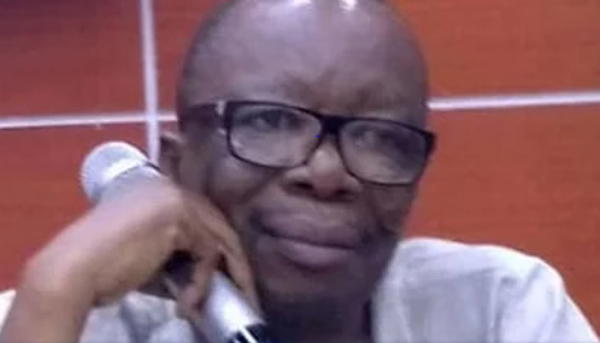
“For the avoidance of doubt, none of the issues that forced our union to resume the suspended strike as listed in the December 2020 FGN-ASUU Memorandum of Action, MoA has been satisfactorily addressed by the government to date.
“The draft renegotiated FGN-ASUU Agreement (second draft) remains unsigned; the University Transparency and Accountability Solution (UTAS) has not been adopted and deployed to replace the discredited Integrated Payroll and Personnel Information System, IPPIS; and the White Papers on Visitation Panels to federal universities, if ready, as claimed by government more than six months ago, are nowhere to be found.
“Similarly, the FG has not delivered on the promised balance of one tranche of the Revitalization Fund more than one year after, the outstanding two tranches of the Earned Academic Allowances, EAA have not been released; and nothing has since happened on the promised support for amendment to the Law of the National Universities Commission, NUC to stem the tide of proliferation of universities especially by state governments.
It was on the basis of the claim by ASUU that none of its demands was yet to be met that it decided to further extend the over six-month-old strike in August 2022.
The stalemate that ensued prompted the FG to drag ASUU before the National Industrial Court, NIC.
FG goes to court
Vanguard reports that following a total breakdown of negotiation, by a letter dated September 8, 2022, the Minister of Labour and Employment forwarded to the National Industrial Court, NIC “a Referral instrument” seeking the determination of certain questions in furtherance of section 17 of the Trade Disputes Act, Cap T8 Laws of Federation 2004 (TDA).
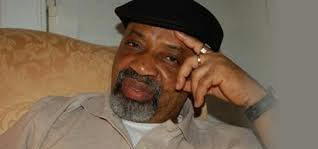
Specifically, the Federal Ministry of Labour prayed the NIC to issue an order compelling ASUU to end the nearly seven months old strike in the interest of the nation and the Nigerian students who are suffering the most from the strike.
The Nigerian government said in the suit that it wanted the court to determine the legality or otherwise of the strike.
It further said: “It asked the court to interpret in its entirety the provisions of Section 18 LFN 2004, especially as it applies to the cessation of strike once a trade dispute is apprehended by the Minister of Labour and Employment and conciliation is ongoing.”
The ministry also wanted the court to determine whether ASUU members were entitled to emoluments for the period they have been on strike.
ASUU had also hired the Chambers of Lagos lawyer and rights activist, Mr Femi Falana (SAN) to tackle the FG in court.
He had reacted to the Federal Government’s suit by filing a preliminary objection to oppose the hearing of the suit.
Court orders ASUU back to work
On September 21, Justice Polycarp Hamman of the National Industrial Court of Nigeria, Abuja Division restrained ASUU from continuing with the strike.
The judge had predicated his decision on Section 18 of the Trade Dispute Act, which he claimed empowers him to make such decisions in the interest of the nation.

In less than 72 hours after the ruling was delivered, the aggrieved university lecturers filed a Notice of Appeal to challenge the order of the Industrial Court.
What the law says on Trade dispute
Vanguard reports that the Trade Dispute Act (TDA) (No.7, 2006 No. 37.) established a framework for the prevention and settlement of trade disputes.
Section 1 of the Act provides: “Where a trade dispute exists or is apprehended, the provisions of this Part of this Act shall apply in relation to the dispute.
Specifically, the TDA prescribes procedure and time in a mathematical manner for resolution of a trade dispute before it results into a lockout or strike.
The TDA in its prescribed procedure established an alternative dispute resolution (ADR) for trade disputes through a mediation or conciliation or the Industrial Arbitration Panel (IAP) rather than through the regular court. NIC being a specialised regular court, has limited jurisdiction under TDA to entertain industrial disputes.
By implication, the first principle under TDA 2006 is that the employer and employees unions have the prerogative to mutually agree on a preferred dispute resolution mechanism consistent with freedom of parties in a commercial contract to choose to resolve their disputes before private adjudicators vested with the power to deliver binding and enforceable awards.
Where such an agreement exists, parties may leverage it under section 4(1) of the TDA.
The expectation is that parties may easily resolve their dispute before it festers in the spirit of give and take, if they act in good faith.
The dispute can be referred to the IAP only after the conciliation has failed.
The Minister is under obligation to refer the dispute to IAP within fourteen days of the receipt of the mediation report under section 6 of the TDA.
Section 17 of the Trade Dispute Act (TDA) 2004 however, clothes the Minister of Labour with powers to refer a trade dispute to the NIC in certain special circumstances.
The section provides: “If in the case of any trade dispute of which he has received a report under section 6 of this Act, it appears to the Minister- (a) that the dispute is one to which workers employed in any essential service are a party; or (b) that in the circumstances of the case, reference of the dispute to an arbitration tribunal would not be appropriate, then, within seven days of the receipt by him of a report under section 8 (5) of this Act, the Minister shall refer the dispute directly to the National Industrial Court.
While it is not in doubt that the Labour Minister is empowered to refer trade dispute to the National Industrial Court after exhausting all available dispute resolution mechanism provided by the TDA, it is arguable if the government had actually followed the procedure before invoking the jurisdiction of the court.
Lawyers pummel FG for going to court
According to a Professor of Commercial Law, Prof. Abiola Sanni (SAN), a calm review of the provisions of section 17 of the TDA relied upon by the Labour Minister to refer the dispute between it and ASUU to the National Industrial Court “will reveal at least two important legal imperatives: First, the Minister must have received the report of a Mediator which will contain, inter alia, the points on which the parties disagreed and describe the steps already taken by the parties to reach a settlement. The second requirement builds on the Mediation Report. It must have appeared to the Minister (from the Mediation Report) that reference of the dispute to IAP is not appropriate.
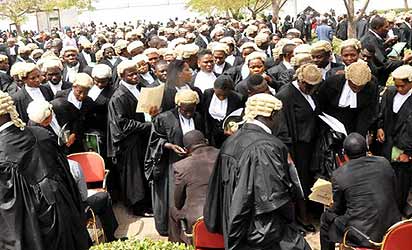
“In view of the time prescribed for the mediation proceedings, it is crystal clear that the Minister ought to have referred the dispute to NIC before the strike started and definitely not when the strike was in its 7th month.
“In the absence of a mediator’s report under section 4 of the TDA, which is a pre-condition for the reference to NIC, it is submitted that the Minister cannot be said to have lawfully invoked his power under section 17 of the TDA.
“It is trite in law that one cannot put something on nothing and expect it to stand,” he said, adding: “Ever before the strike started, the Minister could have exercised his power under section 5(1) of the TDA to direct the parties on steps to be taken within a prescribed time frame to satisfy the requirement of sections 4 and 6 of the TDA and eventually section 17 of the TDA.
Another prominent member of the inner bar and founder of Comfort Chambers, Olalekan Ojo, SAN, said that the decision of the FG to drag the union before the NIC is not the best option in the circumstance since “adjudication by the court is necessarily adversarial in nature,” explaining that government ought to resolve the dispute “via a non-adversarial method, that is through alternative dispute resolution.
Another respected silk, Solo Akuma, SAN, said that the two sides have not properly managed the dispute in the eyes of reasonable members of the society.
According to him, it should be understood that what an academic staff renders is a contract of personal service hence he cannot be compelled to render a service he doesn’t want to render.
Also contributing, another senior member of the inner bar, Chief Yomi Alliyu, SAN, said both parties are not above the law and since they haven’t reached a compromise, either can seek the intervention of the courts.
But a Professor of Law, Isreal Worugji, disagreed with Alliyu’s view on the Federal Government’s action, noting that government should not have allowed the strike action to happen in the first place.
Given the facts of this case with the provisions of the TDA, it does appear that ASUU seems to have stayed too long on the industrial action while the Federal Government ought to get its priorities right by investing more on the existing universities to ensure quality delivery instead of establishing more universities. Even though the matter is already before the court, the Labour Ministry would do well if it could withdraw the suit and seek out of court resolution of the matter.



